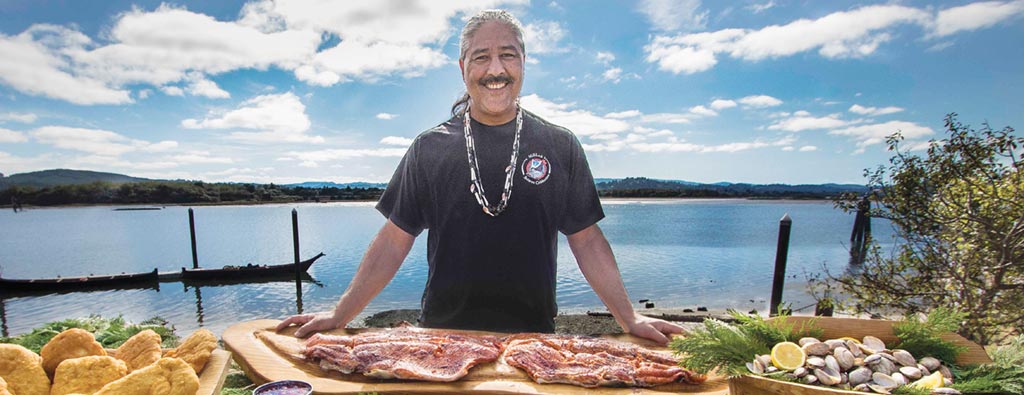Spotlight on the Coquille Indian Tribe & Native American Heritage Month

“We are a proud, powerful and resilient people, a sovereign nation, whose binding thread is our Coquille identity. In the footsteps of our ancestors we celebrate.” - Coquille Indian Tribe
Native American Heritage Month is this month, and we’d be remiss if we did not celebrate our own rich Native American history and recognize the significant contributions made by indigenous people of the southern Oregon coast. Chief Jason Younker of the Coquille Indian Tribe says Native American Heritage Month is about acknowledging the tragic parts of Native American history and how that history impacts their lives today. We honor the heritage and culture of the Confederated Tribes of the Coos, Siuslaw and Lower Umpqua Indians , and in this post, we spotlight the Coquille Indian Tribe (pronounced “ko-kwel”), their past, present and the many contributions they have made to this region throughout history.

Coquille Past
“Our ancestors were here when Rome rose and fell. They were here when Stonehenge and the pyramids were built, and when the last mammoths and saber-toothed cats walked the earth.”
It would be impossible for us to accurately portray the long, rich history of the Coquille Indian Tribe in one post, but it’s important to remember that their ancestors lived and thrived in the fertile landscape on the Southern Oregon Coast for thousands of years, long before Euro-American settlers would arrive. The temperate climate, along with ample access to food and lush coastal forests, allowed the Coquille Indian Tribe to prosper.
Ancestors of the Coquille Indian Tribe spoke multiple languages - those living near Bandon and along Coos Bay’s South Slough spoke Miluk , while those farther south and east spoke an Athabaskan dialect . Tragically, these languages and culture were all but lost after the Euro-American settlers arrived and destroyed their way of life. The U.S. government terminated federal recognition of the Coquille Tribe, as well as scores of other Western Oregon tribes and bands in 1954.
In 1989, Congress passed the Coquille Restoration Act, and the Tribe was once again recognized as a sovereign nation of Indian people. “The Coquille people persevered through decades of devastation,” states the tribe on their website . “After much personal dedication and sacrifice, we regained our federal recognition on June 28, 1989. It was a day that changed the future of our people – a day we will celebrate forever.” In 1996, the Coquille Tribe resumed stewardship of 5,410 acres, a fraction of their ancestral homeland.

Coquille Present
“Despite contagion, dispossession, assimilation and near-annihilation, we are still here.”
Today, the Coquille Indian Tribe has approximately 1,100 members, and controls about 10,000 acres of its ancestral homeland. The bulk of those lands are managed as sustainable forests. “This entire area is Indian country,” says Kassandra Rippee, Tribal historic preservation officer for the Coquille Indian Tribe in this Travel Oregon post . “There’s not a single beach or forest that’s not culturally important to the Tribe.” Tribal members are diligently working to preserve their rich culture and reconnect members with their ancestors’ languages.
Chief Jason Younker is a University of Oregon faculty member. He was recently sworn in when beloved Chief Don Ivy passed away in July. Younker grew up on the shores of Coos Bay’s South Slough and holds three graduate degrees, including a doctorate in cultural anthropology. He also chairs the board of Oregon’s Chemawa Indian School and is past president of the Association of Indigenous Archaeologists.
Contributions
“A rising tide lifts all canoes.”
The tribe’s growing network of enterprises provides $20 million a year in local salaries and benefits, and inject millions into the local economy. In the spirit of the tribe’s “potlatch” tradition, profits and revenue are invested back into the community and help provide education assistance, health care and elder services for both members and non-members. Since 2001, the Coquille Tribal Community Fund has distributed millions of dollars to the area’s non-profit organizations like food pantries, homeless programs, music programs, museums, community centers, veterans groups, and services for children. Just this year, the tribe shared $266,107 with more than 60 community organizations, including a grant to Southwestern Oregon Veterans Outreach . The tribe is also developing innovative solutions to save the Coquille River’s fall Chinook salmon .
Visitors to Oregon’s Adventure Coast: Coos Bay, North Bend, Charleston can learn more about the Coquille Indian Tribe at the Coos History Museum . Ko-Kwel Gifts inside The Mill Casino is open to the public and features an exquisite selection of art, jewelry, and other handmade goods by members of the tribe. Visitors can even view multiple exhibits and displays paying tribute to Coquille history while strolling through the Mill Casino Hotel lobby. We invite you to learn more about indigenous people of Southwest Oregon, specifically the Coquille Indian Tribe, their mission and history, and by visiting www.coquilletribe.org .
Read More
Tribal Heritage - The Coquilles
Tribe picks new chief, other office
Oregon Tribal Spotlight: Coquille Indian Tribe
For more travel inspiration, visit our Adventures page and our Trip Ideas page to discover all there is to do on Oregon’s Adventure Coast, or request a visitor’s packet today ! You may also follow the Oregon’s Adventure Coast Facebook Page , and/or @travelcoosbay on Instagram & Twitter for inspiration. Subscribe to our e-newsletter to have more travel ideas and specials delivered right to your inbox!
Editor’s Note: As the developments in Coronavirus (COVID-19) continue to unfold, please follow the direction of our public health authorities, including the CDC, Oregon Health Authority, and Coos Health & Wellness, to protect yourself, our community and our visitors.
If you are ready to travel, we are ready to welcome you back to Oregon’s Adventure Coast. However, if you are feeling ill or not comfortable traveling right now, we encourage you to stay home and stay healthy. Let’s all do our part to stop the spread of COVID-19. Click here for more information.
